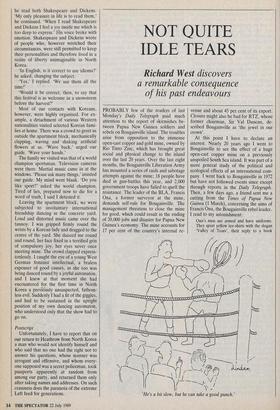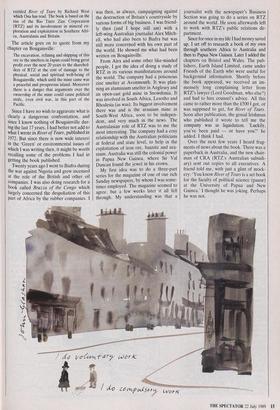NOT QUITE IDLE TEARS
Richard West discovers
a remarkable consequence of his past endeavours
PROBABLY few of the readers of last Monday's Daily Telegraph paid much attention to the report of skirmishes be- tween Papua New Guinea soldiers and rebels on Bougainville island. The troubles arise from opposition to the immense open-cast copper and gold mine, owned by Rio Tinto Zinc, which has brought great social and physical change to the island over the last 20 years. Over the last eight months, the Bougainville Liberation Army has mounted a series of raids and sabotage attempts against the mine; 18 people have died in gun-battles this year, and 2,000 government troops have failed to quell the resistance. The leader of the BLA, Francis Ona, a former surveyor at the mine, demands self-rule for Bougainville. The management threatens to close the mine for good, which could result in the ending of 20,000 jobs and disaster for Papua New Guinea's economy. The mine accounts for 17 per cent of the country's internal re-
venue and about 45 per cent of its export. Closure might also be bad for RTZ, whose former chairman, Sir Val Duncan, de- scribed Bougainville as 'the jewel in our crown'.
At this point I have to declare an interest Nearly 20 years ago I went to Bougainville to see the effect of a huge open-cast copper mine on a previously unspoiled South Sea island. It was part of a more general study of the political and ecological effects of an international com- pany. I went back to Bougainville in 1972 but have not followed events since except through reports in the Daily Telegraph. Then, a few days ago, a friend sent me a cutting from the Times of Papua New Guinea (1 March), concerning the aims of Francis Ona, the Bougainville rebel leader. I read to my astonishment:
Ona's men are armed and have uniforms. They sport yellow tee-shirts with the slogan `Valley of Tears', their reply to a book
We's a bit slow, but he can take a good punch.' entitled River of Tears by Richard West which Ona has read. The book is based on the rise of the Rio • Tinto Zinc Corporation (RTZ) and its involvement in mineral ex- ploration and exploitation in Southern Afri- ca, Australasia and Britain.
The article goes on to quote from my chapter on Bougainville:
The excavation, refining and shipping of this ore to the smelters in Japan could bring great profit over the next 20 years to the sharehol- ders of RTZ at the cost of damage to the physical, social and spiritual well-being of Bougainville, which until the mine came was a peaceful and prosperous island. Moreover there is a danger that arguments over the ownership of the mine could cause political strife, even civil war, in this part of the Pacific.
Since I have no wish to aggravate what is clearly a dangerous confrontation, and since I know nothing of Bougainville dur- ing the last 17 years, I had better not add to what I wrote in River of Tears, published in 1972. But since there is now wide interest in the 'Green' or environmental issues of which I was writing then, it might be worth recalling some of the problems I had in getting the book published.
Twenty years ago I went to Biafra during the war against Nigeria and grew incensed at the role of the British and other oil companies. I was also doing research for a book called Brazza of the Congo which largely concerned the despoliation of this part of Africa by the rubber companies. I
was then, as always, campaigning against the destruction of Britain's countryside by various forms of big business. I was friend- ly then (and I hope still am) with a left-wing Australian journalist Alex Mitch- ell, who had also been to Biafra but was still more concerned with his own part of the world. He showed me what had been written on Bougainville.
From Alex and some other like-minded people, I got the idea of doing a study of RTZ in its various manifestations around the world. The company had a poisonous zinc smelter at Avonmouth. It was plan- ning an aluminium smelter in Anglesey and an open-cast gold mine in Snowdonia. It was involved in South Africa, Lesotho and Rhodesia (as was). Its biggest involvement there was and is the uranium mine in South-West Africa, soon to be indepen- dent, and very much in the news. The Australasian role of RTZ was to me the most interesting. The company had a cosy relationship with the Australian politicians at federal and state level, to help in the exploitation of iron ore, bauxite and ura- nium. Australia was still the colonial power in Papua New Guinea, where Sir Val Duncan found the jewel in his crown.
My first idea was to do a three-part series for the magazine of one of our rich Sunday newspapers, by whom I was some- times employed. The magazine seemed to agree, but a few weeks later it all fell through. My understanding was that a journalist with the newspaper's Business Section was going to do a series on RTZ around the world. He soon afterwards left to work with RTZ's public relations de- partment.
Since for once in my life I had money saved up, I set off to research a book of my own through southern Africa to Australia and then to Papua New Guinea. Later I added the chapters on Bristol and Wales. The pub- lishers, Earth Island Limited, came under Friends of the Earth who were useful for background information. Shortly before the book appeared, we received an im- mensely long complaining letter from RTZ's lawyer (Lord Goodman, who else?) and had to hire counsel's advice. All this came to rather more than the £500 I got, or was supposed to get, for River of Tears. Soon after publication, the genial Irishman who published it wrote to tell me the company was in liquidation. 'Luckily, you've been paid — or have you?' he added. I think I had.
Over the next few years I heard frag- ments of news about the book. There was a paperback in Australia, and the new chair- man of CRA (RTZ's Australian subsidi- ary) sent out copies to all executives. A friend told me, with just a glint of mock- ery: 'You know River of Tears is a set book for the faculty of political science (pause) at the University of Papua and New Guinea.' I thought he was joking. Perhaps he was not.



















































 Previous page
Previous page